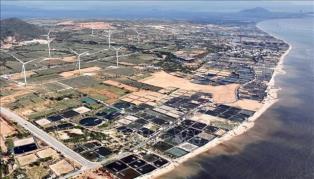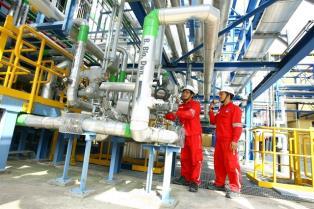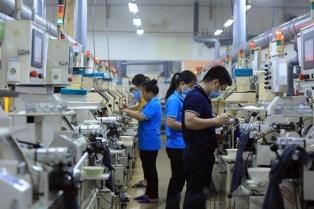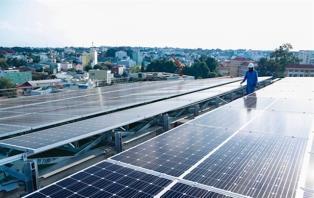Climate action, digital transformation interlinked, bringing obligation, opportunity, forum hears
The Autumn Economic Forum 2025 was the first edition of the forum held under the new administrative structure after recent mergers, reflecting a clear and strategic shift in both urban governance and international collaboration.

The Autumn Economic Forum 2025 concluded in HCM City on November 27 with achievements that significantly surpassed expectations, marking an important milestone in Việt Nam’s expanding international role.
This was the first edition of the forum held under the new administrative structure after recent mergers, reflecting a clear and strategic shift in both urban governance and international collaboration.
The event also marked the start of a deeper partnership between the city and the World Economic Forum (WEF), creating stronger links between global policy agendas and Việt Nam’s development goals.
With over 1,500 domestic and overseas delegates in attendance, together with nearly 100 foreign missions and numerous experts from leading innovation centres, the forum provided a platform for government leaders, global companies, development organisations and researchers to exchange insights. It offered not only speeches but substantive interaction with direct policy implications.
Guided by the city People’s Committee (municipal government) and delivered by the Centre for the Fourth Industrial Revolution, in coordination with national ministries and WEF, the forum demonstrated Việt Nam’s readiness to take on a more central role in shaping the future of growth in the region.
In his keynote address, Secretary of the city's Communist Party Committee Trần Lưu Quang noted that the city had entered a transformative period.
With a population exceeding 14 million and contributing close to one quarter of Việt Nam’s GDP, the city recognised that its global position could not be defined by scale alone. Instead, competitive advantages must now come from innovation, knowledge, connectivity and governance.
The city’s new spatial development strategy follows a multi-centre model, encouraging balanced growth across territories rather than concentration in the historic core, according to Quang. High technology, advanced manufacturing and digital transformation will drive future productivity through industries such as semiconductors, big data and smart microelectronics.
Logistics and trade services are being redesigned to integrate the city more deeply into global supply chains, while another strategic goal is the formation of an international financial centre that connects both regional and global capital flows.
Cultural industries and tourism are also positioned to enhance the city’s soft power. Education and healthcare systems will be reformed to achieve regional excellence, supporting a future workforce capable of leading scientific breakthroughs and handling the rapid evolution of technology.
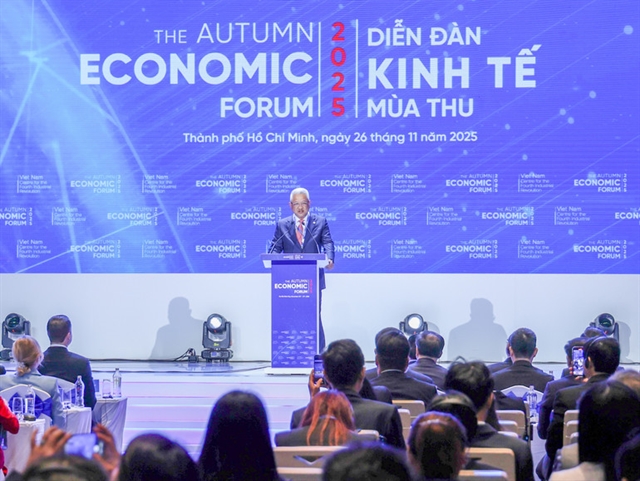
Boost to AI ambition
Artificial intelligence became one of the most discussed topics throughout the forum.
Stephan Mergenthaler, PhD, managing director of WEF, said that the world was moving from an industrial economy to an intelligent economy where progress is determined not only by labour and capital but also by data and responsible AI use.
According to WEF studies, 86 per cent of global companies expect AI to fundamentally reshape their operations by 2035. While 92 million jobs could disappear, around 170 million new ones are likely to emerge in fields requiring advanced digital skills, human creativity and adaptive thinking.
The decisive factor, he said, would be how societies manage the transition for workers. He stressed the importance of individual agency: people must remain drivers of thought, creativity and decision making.
“Technology is a tool and must remain a tool,” he noted. "Over-reliance on AI could weaken independence of thought, which is essential for scientific progress and business leadership."
The demographic advantage of a young, dynamic and flexible workforce places Việt Nam in a strong position to lead Asia in AI adoption. However, this will depend on strong ecosystems that maintain transparency, security and international collaboration.
Major multinational companies demonstrated confidence in Việt Nam’s direction. Amazon is accelerating support for small and medium sized enterprises through knowledge transfer and infrastructure upgrades.
Nokia is expanding cooperation in network systems that will form the backbone of smart urban operations; while PepsiCo voiced strong interest in developing circular production and recycling systems if supportive market mechanisms are put in place.
Elsewhere, Foxconn Industrial Internet sees Việt Nam as a critical base for manufacturing components used in artificial intelligence and high speed communications.
Brand Cheng, chairman of the group, confirmed that Việt Nam’s forward looking policies had encouraged Foxconn to prioritise new projects that integrate AI into both production and product design.
He also highlighted that Việt Nam’s steady growth rate and leaps in electronics exports showed the country was becoming an indispensable part of the global technology ecosystem.
Historic moment
A key message from regional leaders was that climate action and digital transformation are increasingly interlinked.
Countries in Asia are facing the combined pressures of rapid industrialisation, rising energy demand and stronger climate commitments.
This dual transition is therefore both an obligation and an opportunity.
Cambodian minister Hem Vanndy argued that Asia must improve coordination in standards, taxation and logistics to ensure the region does not lose competitiveness while moving towards low carbon growth.
He noted that the global restructuring of supply chains was already underway, driven by geopolitics and technological change, giving Asia a rare opening to climb the value ladder.
Meanwhile, Malaysian minister Chang Lih Kang reiterated that science and technology must remain centred on humans. He said that the country was mainstreaming digital skills through national education reforms and investing in industries such as clean energy and innovative transportation.
China’s representative Long Quoqiang emphasised China’s support for the open flow of knowledge and technology, saying that the green transition was a global project where all nations must contribute. He also presented evidence of how digitalisation had helped China scale up renewable energy while reducing costs.
Discussions highlighted that Asia, home to some of the world’s fastest growing economies, is well placed to become a leader in sustainable growth over the next two decades.
Ideas shared at the forum indicate that regional cooperation through cross border data exchange, standard alignment and green investment will be pivotal to capturing these opportunities.

Leading regional growth
Prime Minister Phạm Minh Chính highly valued the forward thinking proposals raised during the forum.
He emphasised a model of cooperation defined by “joining hands, sharing interests and advancing together”. Economic growth, he said, must not only lift enterprises but guarantee benefits for citizens and ensure that no part of the economy is left behind.
To sustain momentum, the Prime Minister requested ministries and local authorities to carefully study the forum’s conclusions and establish a roadmap that translates commitments into action.
He also asked for a thorough review of existing regulations, particularly those governing land management, investment, clean energy and environmental protection. Bottlenecks must be removed quickly so that businesses can innovate and expand.
Meanwhile, administrative reform would remain one of the Government’s strongest priorities. Cutting unnecessary procedures and simplifying business conditions would save time and resources, boosting competitiveness.
Support policies were also being designed for sectors such as green technology, financial services and high technology manufacturing.
The Prime Minister proposed that the Autumn Economic Forum be developed into a regular WEF event hosted in Việt Nam, similar to the WEF meetings that take place annually in Tianjin and Dalian. This would strengthen Việt Nam’s role in global policy networks and attract global investors to the country’s emerging hubs of technology and innovation.
Chairman of the HCM City People’s Committee Nguyễn Văn Được confirmed that the city was fully committed to working with the private sector and international organisations during 2026–2030.
Được stressed that the forum challenged the city to move faster and to deliver results that meet the expectations of both citizens and partners. He also highlighted the need to advance institutional capacity, expand digital infrastructure and develop a workforce able to take on leading roles in science and technology.
The next five years would be crucial for ensuring the city can become not only a centre of growth but a centre of innovation with global reach, Được added. VNS


